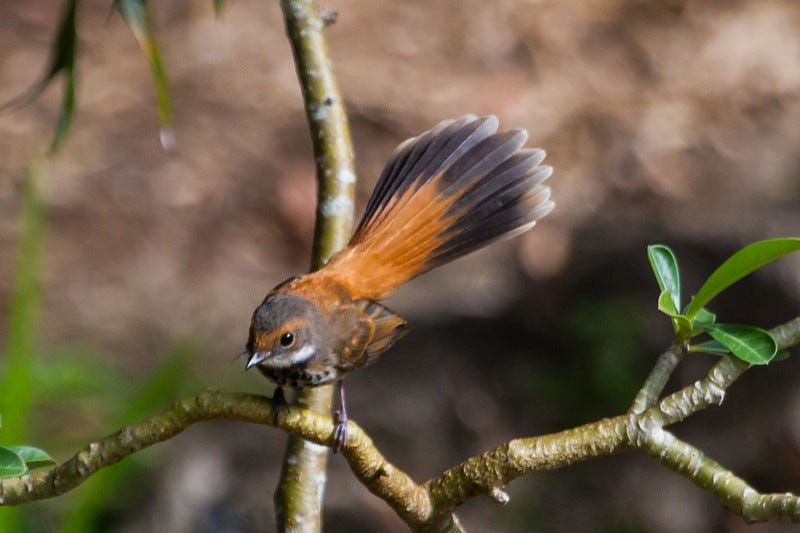Dappled Things
Glory be to God for dappled things; for the inconvenient; for the swift and slow; the sweet and the sour

Pied Beauty by Gerald Manley Hopkins
Glory be to God for dappled things –
For skies of couple-colour as a brinded cow;
For rose-moles all in stipple upon trout that swim;
Fresh-firecoal chestnut-falls; finches’ wings;
Landscape plotted and pieced – fold, fallow, and plough;
And áll trádes, their gear and tackle and trim.
All things counter, original, spare, strange;
Whatever is fickle, freckled (who knows how?)
With swift, slow; sweet, sour; adazzle, dim;
He fathers-forth whose beauty is past change:
Praise him.We have a bird bath we can see from our kitchen with camellias on three sides. Over the years the camellias have grown into small trees that almost touch each another. The area used to be quite open and sunny but now the bird bath is mostly shaded with only very dappled sunlight reaching it. I wanted to cut the camellias back to let more sun into our kitchen area but in the past six months we’ve noticed more and more small birds taking advantage of our birdbath - fairy wrens, honeyeaters, and one day, a few weeks ago, four rufous fantails, probably on their migration north for the winter. The camellias and the scattered light offer a place of refuge for these little darting creatures so I’ve left the trees as they are and put up with the inconvenience of less sunlight inside.
Glory be to God for dappled things; for the inconvenient; for the swift and slow; the sweet and the sour.
Often it’s only as we look back from a distance that we appreciate the unchosen, uncomfortable aspects of our lives. We gain a better perspective in hindsight.
Earlier this year I read A Gentleman in Moscow, a novel by Amor Towles. The book’s protagonist, Count Rostov, was born into a life of wealth and privilege but his circumstances changed dramatically in his early thirties when he was placed on house arrest for life. He exchanged freedom for restriction, and a life of ease for one of inconvenience. Many years later he reflected on his life and said this to a friend,
“'I’ll tell you what is convenient…To sleep until noon and have someone bring you your breakfast on a tray. To cancel an appointment at the very last minute. To keep a carriage waiting at the door of one party, so that on a moment’s notice it can whisk you away to another. To sidestep marriage in your youth and put off having children altogether. These are the greatest of conveniences, Anushka - and at one time, I had them all. But in the end, it has been the inconveniences that have mattered to me most.’’
Charlotte Mason in Ourselves, her volume on improving character and conscience, gives us a picture of Fortitude. She describes it not so much as a valiant virtue but as a patient grace. It’s a delicate plant with no particular beauty or strength that grows up within us. Fortitude is ‘memorable more for what she suffers gladly than for what she does,’ and seems to always have an element of tenderness about her, too, enduring hardship out of love and compassion for others.
It is in the body we must endure hardness, and the training comes in the cheerful bearing of small matters not worth mentioning.
I think that most of us tend not to choose the inconvenient and uncomfortable if we can help it, even in small matters.
Life can be fickle and strange and we don’t always have control over what comes our way. We may feel invisible, set aside, or in a lonely place, but God sees and has not forgotten us. It’s encouraging to think that the things we didn’t choose for ourselves might matter the most to us later on. Perhaps something we considered to be inconvenient might be the stimulus for Fortitude to grow up within us. Patient grace is not a common commodity in our modern times but the world is in need of tender hearts that will create a safe resting place for harried travellers, like the four rufous fantails that only stayed for a day.
This article was my first contribution to the Common Place Quarterly (CPQ) magazine where I continue to write a column titled Dappled Things. (Volume 3 Issue 2).
You may be receiving this email because you had subscribed to my Wordpress blog, journey & destination, which is no more. I hope you stay around!





So beautifully put Carol! Watching birds really brings out the heart in me too. We simply must pay you a visit to delight in these smaller birds.
This post reminds me of St Therese of the Little Child Jesus who is quoted as saying “Sufferings gladly borne for others convert more people than sermons.”
Very timely, thank you!